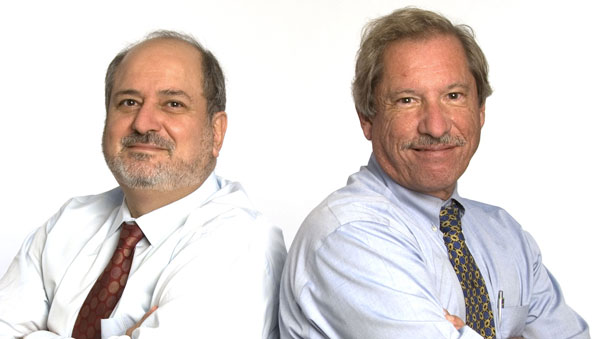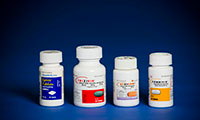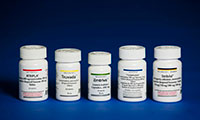HIV Antiretrovirals
OTT: HIV/AIDS, 3TC/FTC & Emory
Discovery of HIV Antiretroviral Drugs Led to Largest University Royalty Deal in History
More than 90 percent of people in the U.S. who have HIV, and many around the world, take at least one of the drugs invented by Emory researchers Ray Schinazi, Dennis Liotta, and Woo-Baeg Choi. "This is an incredible example of the impact that academic research can have on people's lives," says Todd Sherer, Executive Director of the Office of Technology Transfer. "We are very proud that the work by Drs. Liotta, Schinazi and Choi has helped so many people."

Raymond Schinazi, PhD and Dennis Liotta, PhD
In the early 1990s, Schinazi, an infectious disease and antiviral expert, Liotta, a chemist, and Choi, who was a postdoctoral research associate in Liotta's lab at the time, announced the discovery of an unusual molecule, FTC (emtricitabine, sold alone as Emtriva®, with the "Em" standing for Emory) and a chemically similar compound, 3TC (lamivudine, sold alone as Epvir®).
"In addition to being quite effective, Emtriva® is one of the safest antiretroviral agents available," says Liotta. "This is quite important because AIDS patients have to take their drug regimens every day of their lives."
Both drugs are in the class known as nucleoside reverse transcriptase inhibitors, which work against the enzyme that copies HIV RNA into new viral DNA.
"Everyone was intrigued but skeptical about our work—no one realized the importance of what we had found," Schinazi says. "We pushed Emory University very hard to file patent applications to protect these inventions (FTC and 3TC). Emory finally did, and received the rewards less than ten years later."

GlaxoSmithKline/Shire Bottles
This would culminate in a $540 million deal, the largest royalty sale at the time in higher education.
FTC was licensed in 1996 to Triangle Pharmaceuticals, a biotech company founded by Schinazi in 1995. In 1999 and again in 2002, Emory resolved patent disputes with various third parties to consolidate intellectual property rights and clear the path to market for FTC.
In 2003, Gilead acquired Triangle for $482 million; in the same year, FTC was approved by the FDA. Shire and GlaxoSmithKline jointly licensed Emory's patents related to 3TC, which is contained in at least five FDA-approved therapeutics (including a drug to treat chronic hepatitis B).
In 2005, Gilead Sciences and Royalty Pharma signed a deal with Emory to buy its FTC royalty interest for $525 million. Gilead paid Emory an additional $15 million to alter the terms of the license as it relates to the company's plans for developing the compound for use against another disease. Emory College and the School of Medicine were major beneficiaries of the $540 million sale, along with the departments of chemistry and pediatrics and the laboratories of Liotta and Schinazi. Choi left Emory to found the drug-discovery company FOB Synthesis Inc. The three scientists shared 40 percent of the sale.

Gilead Bottles
In August 2004, Gilead obtained approval for Truvada®, a fixed-dose combination of Emtriva® and Viread® for use by people infected with HIV. (In July 2012, the FDA also approved the use of Truvada® to help uninfected people at high risk for the AIDS virus. Truvada® was the first HIV drug to be approved by the FDA for preventative use.)
In July 2006, Gilead and Bristol-Myers-Squibb gained approval for the first once-a-day, single tablet regimen for adults with HIV— Atripla® —from the FDA. Atripla® is intended either as a stand-alone therapy or to be used in combination with other antiretrovirals.
By combining the three drugs, efavirenz (Sustiva®), emtricitabine (Emtriva®) and tenofovir disoporxil fumarate (Viread®), Atripla® reduces pill burden and simplifies dosing schedules, easing compliance, storage, transport and distribution. In North America and Europe, Atripla® is marketed jointly by Gilead and BMS, but in much of the developing world, marketing and distribution is handled by Merck & Co. Merck announced that it will lower the cost of the drug in countries with high HIV prevalence, and will use a sliding scale based on each country's wealth. It is registering Atripla® in forty-five countries in the Middle East and Africa and in nine countries in Latin America, the Caribbean and Asia.
Schinazi is the Frances Winship Walters Professor of Pediatrics at Emory and director of the Laboratory of Biochemical Pharmacology. Liotta is the Samuel Candler Dobbs Professor at Emory and Executive Director of the Emory Institute for Drug Development.
"It's very gratifying to see that our work has helped so many people all over the world," Schinazi says. "HIV is no longer a death sentence."
There is a series of blog pieces that accompany the patient centered video project linked above on this technology.